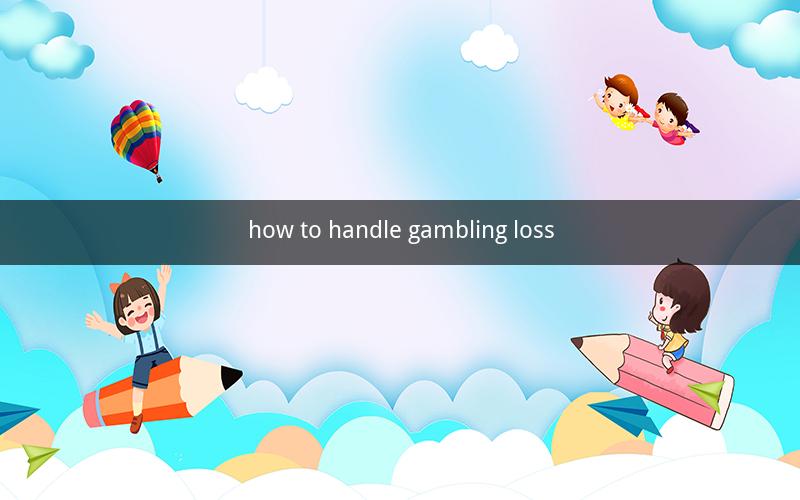
Handling Gambling Loss: Strategies and Support
Table of Contents
1. Understanding the Problem
2. Recognizing the Signs of Problem Gambling
3. Assessing the Extent of the Loss
4. Taking Immediate Steps
5. Seeking Professional Help
6. Developing a Budget
7. Creating a Support Network
8. Understanding the Psychological Impact
9. Learning from the Experience
10. Preventing Future Losses
1. Understanding the Problem
Gambling can be an entertaining and thrilling activity, but it can also lead to significant financial and emotional consequences. It's important to recognize that gambling loss is a serious issue that can have long-lasting effects on individuals and their loved ones.
2. Recognizing the Signs of Problem Gambling
Identifying the signs of problem gambling is crucial in addressing the issue. Common signs include lying about gambling activities, feeling restless or irritable when not gambling, chasing losses, and prioritizing gambling over other responsibilities.
3. Assessing the Extent of the Loss
Determining the extent of the loss is the first step in taking control of the situation. It's important to face the reality of the financial consequences and understand the impact on personal and family finances.
4. Taking Immediate Steps
Once the extent of the loss is assessed, it's essential to take immediate steps to mitigate further damage. This includes halting any further gambling activities, contacting creditors, and seeking financial advice.
5. Seeking Professional Help
Problem gambling is a complex issue that often requires professional intervention. Seeking help from a therapist or counselor who specializes in gambling addiction can provide the necessary support and guidance to overcome the addiction.
6. Developing a Budget
Creating a budget is essential to regain financial stability. It involves tracking income and expenses, setting realistic financial goals, and prioritizing necessary expenses.
7. Creating a Support Network
Support from friends, family, and support groups can be invaluable in overcoming gambling loss. Sharing experiences, seeking advice, and having a strong support network can help individuals stay motivated and committed to their recovery journey.
8. Understanding the Psychological Impact
Gambling loss can have a significant psychological impact on individuals. It's important to acknowledge and address the emotional and psychological consequences, such as depression, anxiety, and guilt.
9. Learning from the Experience
Reflecting on the gambling experience and identifying the factors that contributed to the loss can provide valuable insights. Learning from these experiences can help individuals make better decisions in the future and avoid repeating the same mistakes.
10. Preventing Future Losses
Preventing future losses involves adopting healthy gambling habits, setting personal limits, and being aware of the risks associated with gambling. It's important to maintain self-discipline and avoid falling back into old patterns of problem gambling.
Additional Questions and Answers
1. Q: How can I determine if I have a gambling problem?
A: If you find yourself lying about your gambling activities, feeling restless or irritable when not gambling, chasing losses, or prioritizing gambling over other responsibilities, it may be a sign of problem gambling.
2. Q: Can seeking professional help for gambling addiction be confidential?
A: Yes, seeking professional help for gambling addiction can be confidential. Many therapists and counselors adhere to strict confidentiality guidelines to protect the privacy of their clients.
3. Q: What should I do if I am unable to pay my gambling debts?
A: If you are unable to pay your gambling debts, it is important to contact your creditors immediately. Exploring options such as negotiating payment plans, seeking financial counseling, or declaring bankruptcy may be necessary.
4. Q: Can a support group help me overcome gambling loss?
A: Yes, support groups can be a valuable resource for individuals struggling with gambling loss. They provide a platform for sharing experiences, receiving support, and learning from others who have overcome similar challenges.
5. Q: How can I create a budget to manage my finances after gambling loss?
A: To create a budget, start by tracking your income and expenses. Set realistic financial goals, prioritize necessary expenses, and allocate funds for entertainment and savings. Regularly review and adjust your budget as needed.
6. Q: Can gambling addiction be cured?
A: While there is no quick fix for gambling addiction, it is possible to overcome it with proper treatment and support. With determination, commitment, and professional help, individuals can overcome gambling addiction and lead a fulfilling life.
7. Q: How can I avoid falling back into old patterns of problem gambling?
A: To avoid falling back into old patterns, it is important to develop healthy gambling habits. Set personal limits, avoid triggering situations, and seek support from friends, family, or support groups to stay accountable.
8. Q: Can therapy help me overcome gambling loss?
A: Yes, therapy can be highly effective in helping individuals overcome gambling loss. Therapists can provide personalized support, coping strategies, and tools to manage the psychological and emotional consequences of problem gambling.
9. Q: What should I do if I am worried about a loved one's gambling behavior?
A: If you are concerned about a loved one's gambling behavior, it's important to approach the situation with empathy and understanding. Encourage them to seek help, offer support, and consider seeking guidance from a professional.
10. Q: How can I stay motivated during my recovery journey?
A: Staying motivated during the recovery journey involves setting small, achievable goals, celebrating progress, and seeking support from others. Remembering the reasons for seeking recovery and the positive impact it will have on your life can also provide motivation.